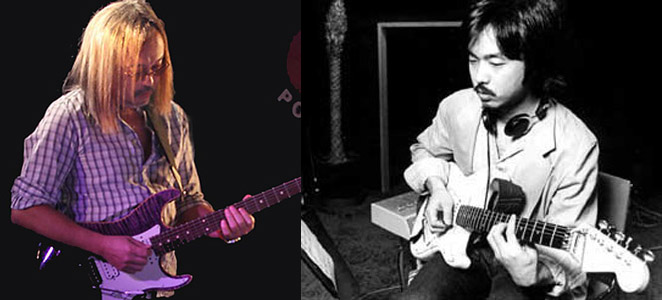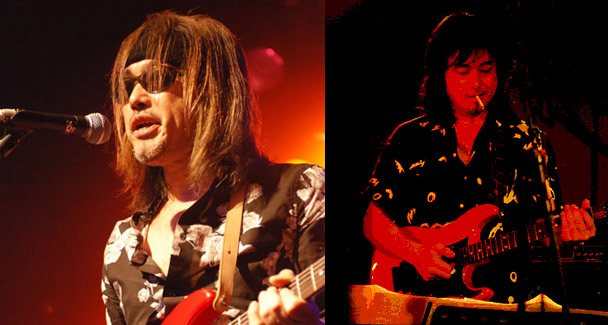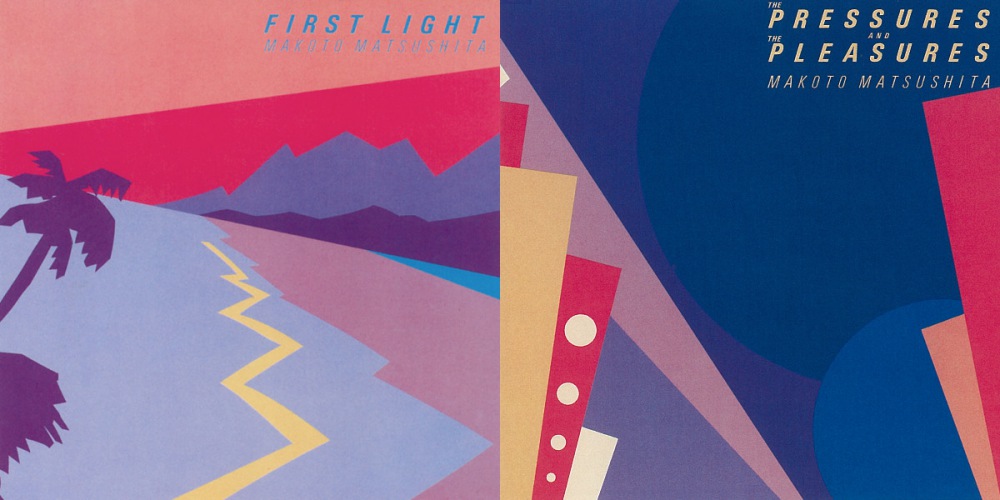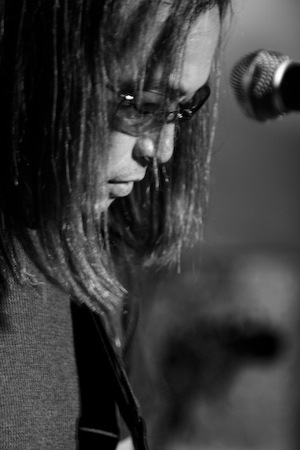Here is a rare interview with Mr. Matsushita Makoto in which he talks about his career, focusing especially on his first two solo albums. Highly recommended reading for fans of this man’s work.
On a personal note, I might mention that in my mind First Light is one of the very best, genre-defining city pop albums of all time. That’s my story and I’m sticking to it, dammit.
Interview & text: Kawamura Yusuke & Takaki Rita (Japanese text)
English translation: Henkka
Note: You can buy Matsushita Makoto’s music from CDJapan.
Profile
At the age of 18, he was admitted to the Nem Conservatory where he majored in guitar, studying music theory, composition, and arrangement. At 19, he began working professionally as a live musician, playing more than 500 shows over the span of four years. At 22, he did his first studio work when he was in charge of sound production and arrangement on Yamane Mai’s Tasogare, after which he would go on to work with countless of artists as an arranger, producer, and guitarist at the heart of the Japanese pop music scene.
As a recording artist, he released three solo albums in the 80’s. Furthermore, he has done pop rock in AB’S, progressive rock in Paradigm Shift and Future Days, contemporary jazz fusion in Groove Weather, a cappella chorus music in Breath by Breath, funk rock in Rainey’s Band, as well ambient music and total improvisation in Nebula and other bands in his search of completely new types of sounds.
Guitarist and arranger Matsushita Makoto, known especially for his chorus vocal arrangements for artists like SMAP and KinKi Kids, his supporting work for a great number of artists, and for being a member of AB’S alongside Yoshino Fujimaru.
Now, two of the albums he released in the 1980’s under his own name are being reissued along with bonus tracks and the latest high-resolution remastering. Those two releases are First Light, featuring first-rate pop notable for its meticulous arrangements and musical performances, and The Pressures And The Pleasures, more closely reflecting its creator’s personal tastes with its strong prog rock influence. Even amidst growing appreciation for Japanese music from the 1980’s, these releases stand out as highly acclaimed masterpieces both in an outside of Japan. Both of these amazing albums shine with an evergreen glow.
In commemoration of the reissuing of these two albums, we conducted an email interview with the artist himself. In this rare interview, we asked him about the beginnings of his career, the time period of his solo releases, and what he has been up to since then.
— First of all, according to your profile you initially debuted as a supporting live and studio musician at the age of 19. Entering the world of music at such a young age, how did you actually first get started as a recording artist? Was there perhaps someone who might be called a “key person” to your career?
Matsushita Makoto: Music-wise… It started with bands like the Rolling Stones, Cream, and Led Zeppelin, and then in high school I devoted myself to prog rock like Yes, King Crimson, and Pink Floyd. I then naturally wanted to become a musician myself, but since I had no musical background or knowledge I just gave up on the idea.
But then one day I happened to come across the complete opposite of prog rock in the music of Neil Young. I was actually so moved, I thought maybe it was something I might be able to do after all. Later, even once I got into music school and started doing live and studio work, I always wanted to be doing my own music.
As for people who would take the time to listen to my songs back then, inspiring me to become an artist and nurturing me as a musician, there are too many for me to name them all.

— Who were your guitar heroes in the early days when you first set your sights on becoming a musician?
Matsushita: I wasn’t initially aiming to become a guitarist—I was simply interested in music-making as a whole, so I had no guitar heroes in particular. If I had to name someone, I suppose it would’ve been the guitarists of the bands I just mentioned. Great guitarists will also be great at making music.
— When you produced Yamane Mai’s Tasogare as well as Tahara Toshihiko’s album at the age of 22, it marked a turning point for you as a producer, subsequently making you a very busy man. Could you maybe tell us a story that illustrates just how active you were in those days?
Matsushita: Even if I do say so myself, I was insanely busy back then. It was typical for me to stay up working all night two or three days a week, and whatever days off I managed to get I would just spend sleeping to give my body some rest. I would tell people, half-jokingly, how my only dream in life was to go for a drive around Shonan in the summer. I had absolutely no time for myself.
By the way, I wrote the song “One Hot Love” on my first album, First Light, about that very dream. (laughs) I only managed to finally go for that drive in my mid-thirties, but it turned out that the sea over at Shonan wasn’t like how I had pictured it. I looked up other similar places where one could check out the sea before finally finding this one spot out in Nishi-Izu. Ever since then I’ve made it a point to always give myself a summer vacation and head out there once a year.
— When TV Asahi Studios first installed a 16-track recording system, they wanted to kick things off with a test recording. This was actually what led to the release of your solo album, First Light. How did this test recording at TV Asahi Studios come about?
Matsushita: You’ve really done your homework! (laughs) I must’ve been around 21 or so. Through being introduced to them by a senior musician of mine, TV Asahi Studios approached me with an offer to make a test recording for them using one of my original songs.
8-track recorders had been the norm up until that point, and the lack of channels made things very difficult—it wasn’t even enough for the rhythm section alone. Creating the kind of sound I wanted was thus always a struggle, and so I was very excited about the prospect of having access to 16 channels, knowing it would instantly solve all our problems. It felt like the coming of a new era.
After that, it wasn’t long until we had 24 channels, went from analog to digital, had 32 channels, 48 channels, and then entered the Pro Tools era. But if you were to ask me if all this evolution in recording techniques also led to the evolution of music as a whole…? I wouldn’t necessarily say that it did, no. I have mixed feelings about it all.
— How did these recordings then lead to your solo release?
Matsushita: A producer from Nichion happened to hear this song called “September Rain” that I did for the test recording, and they approached me about doing a solo album. That song was included on the First Light album.
— Did you have any sort of concept in mind for First Light, especially in terms of its sound?
Matsushita: As it was my first album, I tried to keep it simple and “pop.” I just did my best to show off all the AOR influences I’d absorbed up until that point—there was no special concept to it besides that. Sorry for the brief answer. (laughs)
— Were there are any works by overseas artists that were an influence on you, or works that you modeled this album after?
Matsushita: That was the golden age of AOR, and I was still young, busy being influenced by all kinds of different artists. As for specific works I used as a model, there are just too many to list. If I had to answer something, I might nominate the works of artists like Airplay, Steely Dan, Pages, Jay Graydon, etc.
For example, the song “Lazy Night” that’s on First Light. I wrote that song based on my image of the album cover of Steely Dan‘s Gaucho, and it also sounds similar to a track on the album called “Glamour Profession.” Even compared to the rest of their works I believe this song to be one of their absolute masterpieces.

— Your first album was released in 1981 through RCA/Air, while The Pressures And The Pleasures (1982) was the first album to be released by Moon Records. They would later go on to release a great number of records by people like Yamashita Tatsuro and others—works that are nowadays referred to as “city pop.” How did your albums come to be released through Moon Records?
Matsushita: The person who established Moon Records was actually the president of RCA/Air when First Light was released, so I just transferred over there with him when he went independent… That’s all there is to it.
— How was the response to your debut album when it was first released?
Matsushita: Obviously I don’t remember it selling very much at all. (laughs) I guess it created a little bit of a buzz. That reminds me… There were these record rental stores that were popular among the youngsters back then, and I remember hearing how at a couple of those stores—in Roppongi and another one somewhere in Osaka—it was actually their no. 1 most rented out album. To me, that meant so much more.
— Presently you are busy doing various kinds of backing vocal arrangements. How were you thinking about that aspect of the music when you were working on your solo material? Was there anything you were doing in your early solo material that remains unchanged to this day in the way you approach backing vocal arrangement—that is, some fundamental aspect of it that has never changed? And if so, what might that thing be?
Matsushita: I was a member of our high school choir. Singing chorus is… It’s difficult to explain to someone who hasn’t experienced it, but it’s a totally different type of pleasure one gets from, say, playing an instrument or singing solo vocals.
When your voice resonates with the voices of others and those vibrations fill the air, I can’t even express in words how emotionally moving it is. Even just a simple Do-Mi-So chord, when you manage to harmonize it perfectly there’s no feeling like it. So I’ve always had the desire to do chorus singing. I later also made two albums with an a cappella group called Breath By Breath.
— Today, the AOR sound of your first album is enjoyed by many younger generations under the name of “city pop.” How do you feel about this?
Matsushita: Looking back, one important aspect of AOR was in the musical development of the rhythm section. Music in the 1980’s had complicated chord progressions and rhythm combinations, and I do believe there was a “backlash” against all that in the 1990’s. They scraped off all the excess meat while the lyrics also started heading in a more realistic direction. Computer technology, too, must have greatly influenced the music…
But since around 2010, doesn’t it kind of feel like there’s been another backlash against all that? Of course, when you listen to the 80’s stuff now, most of it does come across as sounding pretty dated. But setting aside the “freshness” of the sound itself and speaking purely from a musical point of view, there was something really quite musically significant established in the 80’s. That must be something that’s now reaching the ears of those younger generations without them even realizing it.
Moreover, music made on computers no longer sounds “new.” And people are always quick to get bored of stuff. (laughs) Music that’s made entirely by human hands—there’s just something different about that sound. I feel like these major trends are always repeating, once every 20 years or so.
— Do you yourself listen to music made by those younger generations?
Matsushita: I’m always curious about new music. But while there’s constantly amazing new artists popping up, I can’t say I’ve heard anyone who’s been influenced by me… (laughs)
— Your second album, The Pressures And The Pleasures, has an electronic/progressive rock feel to it. What was your goal in creating the sound for this second album?
Matsushita: Having been able to bring out my pop side on the first album, it gave me the desire to go after something more musically ambitious. I was beginning my pursuit to become more original in terms of music, and I’d always loved music besides pop as well—King Crimson, Yes, Pink Floyd, Weather Report, Miles Davis, etc.—so I wanted to do something more adventurous.
That pursuit is what led to the creation of two songs: “The Pressures And The Pleasures” and “The Garden Of Walls.” It was a totally different sound compared to the pop approach on my first album, so the folks at the record label must’ve been quite startled. (laughs)
Also, just before I started working on this album I got to see Miles Davis’ Japan comeback concert. That was a huge inspiration for me. I was deeply moved seeing him going beyond the framework of jazz and constructing his music in a totally original way, all while enduring his illness. “The Garden Of Walls” is my tribute to Miles.
— Did The Pressures And The Pleasures have any further concept?
Matsushita: Being involved in sound production in the 1980’s, there was one thing about it that bothered me: the fact it was pretty much all love songs. To put it bluntly, I was repulsed by it. “Is there nothing else you want to express as a fellow human being besides the theme of love?!”
I was brought up on music influenced by the whole flower power movement. Songs with themes of anti-war and freedom had the backing of all the young people—there was an uplifting sense of a new era being ushered in. But the truth is that as we got into the 1980’s, songs with those kinds of themes faded into the background… That was what made me decide to write songs about things besides love.
I was myself growing up spiritually at the time, and so I was awakened to the whole idea of dualism—”one can grow only once they see both extremes of things.” And “The Pressures And The Pleasures” was a song born out of all that. I commissioned Chris Mosdell to write the lyrics, and I remember as I was explaining all this to him in my shoddy English, midway through my explanation he was already going, “Oh, I see!” He got it right away.
It’s a shame how we now seem to be going backwards, away from the whole “freedom and loving your neighbor” mentality we had back then… This conversation took a bit of a difficult turn, huh? (laughs)
— Did you play any of this solo material live back then?
Matsushita: We used to play “The Pressures And The Pleasures” and “The Garden Of Walls” with my band, Paradigm Shift. “The Pressures And The Pleasures” goes on for over 11 minutes even on the album, but when we did it with the band it would become this 40+ minute epic.
— You have released four solo albums so far, and considering the length of your career that’s not very much at all. Is there any reason that you find collaborating with bands and such to suit you better than solo work?
Matsushita: Not particularly. I simply started putting more of my focus on Paradigm Shift.
— While it is only obvious, it feels like there’s a separation between your solo work and your various arrangement/production projects. Back in those days, did you have an especially strong sense of drive when it came to your solo material and the works where you were a main featured artist?
Matsushita: A bit of a pointed question, huh! (laughs) Well, from the moment it was decided that I would be releasing my own music, releasing it under my own name was a decision completely removed from any business perspective—I simply wanted to create something purely out of my musical cravings.
My desire to make pop music was already thoroughly satisfied through my work, and I even got to show that side on my first album as well. So then as time went on I started to experiment more in order to broaden my musical range, and as a result my solo work has ever since then always seemed to fall outside the framework of pop. It’s no wonder nothing I ever did sold well. (laughs) And that never bothered me.
Truth is that I’ve seen lots of artists who had great musical talent, and yet they were never successful in this field. Through being involved in the music industry myself, at some point I came to realize that “good music” and “business” don’t necessarily always go hand in hand.
— After The Pressures And The Pleasures, whether it was your independent ambient project CONFESSION or Paradigm Shift, your 2000’s ambient session System III, or the one with Ito Koki in NEBULA, one keyword that describes your solo material ever since then is “ambient.” In those early years of the 1980’s, jazz from labels like ECM, Brian Eno’s ambient works, the prog rock-influenced electronic works of German bands like Cluster or Manuel Göttsching/Ash Ra Tempel, people like that were releasing material that seemed very similar to what you yourself were doing at the time. Were you influenced by that kind of a sound? What did you think of it?
Matsushita: Harold Budd and Brian Eno’s The Plateaux Of Mirror was a revolutionary album for me. I still vividly remember the day I bought that album. I was listening to it in the evening, the setting sun shining into the room as I sat there thinking about the life of my father who had just passed away not long before.
I was in something of a meditative state, when suddenly it hit me! This was a kind of music which didn’t require the listener’s attention. Normally, music is something you evaluate through carefully listening to its content. But with this sound, those aspects of music which would require one’s attention had deliberately been excluded—the intention there was only to create an atmosphere that would envelop the listener. Having said that, even if you do give it your attention as you listen you’ll notice it’s also very high quality stuff in musical terms, too.
In any case, it changed the very nature of music for me. After that realization, I just had to try making something like that myself, too. What can I say? I like to experiment (laughs) I first tried creating ambient in 1983.
— With you going so far as to calling CONFESSION your lifework, why did ambient music become such an important part of your musical expression?
Matsushita: It’s what I want to make—simple as that. (laughs) In creating it I’ve always had a theme: everything about it, beginning with the very first sound, has to be improvised. After all, composition is a deliberate act, and once something deliberate makes it into the sound then it inevitably ends up diverging from “ambient.”
So when I’m making ambient music I only use the computer as a recorder—I’ve never done any pre-programming. This style of total improvisation subsequently led to other experiments, too. Obviously nothing that would lead to any business, though. (laughs) It’s purely a personal hobby.
— Your first three solo albums as well as Paradigm Shift’s releases are currently highly acclaimed not just domestically but overseas as well, with the original vinyl pressings being bought and sold at high prices. Especially in the past few years and especially in Europe, the kind of 1980’s Japanese prog rock/ambient type music—such as your second album and Paradigm Shift’s material—has been gaining in popularity. Were you aware of this being the case? How do you feel about it?
Matsushita: I had no idea. Is that right? (laughs) If that’s really the case, then I’m very glad.
— By the way, have you received any direct offers about reissuing your albums overseas?
Matsushita: No, I haven’t. Maybe they just don’t know how to contact me? (laughs)



Matsushita Makoto is a great musician. I just orderd the album First Light in Japan since it is sold out in The Netherland. Thanks for the interview. Arigato!
Hey Steven. First Light is just a fantastic album. I do believe it’s only going to keep standing the test of time. Thanks for reading!
I wish matsushita would appear more. I truly love his albums work and how it sounds. I would love to see him do a concert one day
Same here! I believe he still plays live with some of his bands, but I don’t think he performs songs from his solo albums anymore. (Although I could be wrong about that.) I’d love to see him do like a tour where he performs stuff exclusively from his early albums.
im a big makoto fan and i know everything about his life. When I found this website I was shocked because I had never known some of these things. Thank you so much for this its super fascinating
Hey matthfu. I’m also glad you found this interview. Cheers!
Special musician. I wish I could see him live. I am more of a fan of his work with AB’S but his solo work was exceptional. Wish he could find out that he has inspired people over in England!
Hey Freddie. I’ve only heard the first AB’S album, and even that one just once or twice. Your comment reminds me that I really need to do a deeper dive on them.